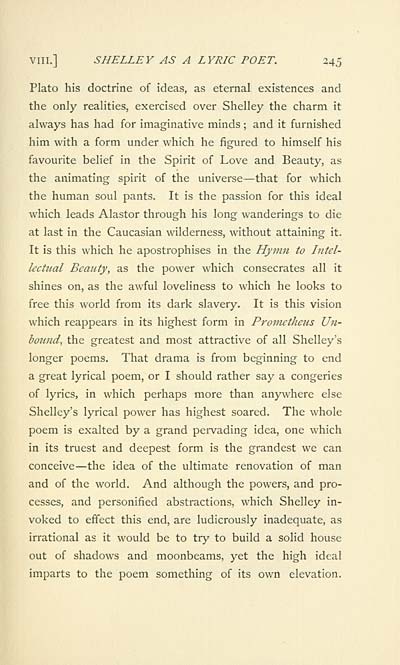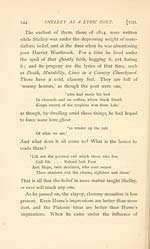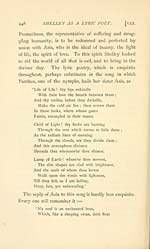Ossian Collection > Aspects of poetry
(261)
Download files
Complete book:
Individual page:
Thumbnail gallery: Grid view | List view

VIII.] SHELLEY AS A LYRIC POET. 245
Plato his doctrine of ideas, as eternal existences and
the only realities, exercised over Shelley the charm it
always has had for imaginative minds ; and it furnished
him with a form under which he figured to himself his
favourite belief in the Spirit of Love and Beauty, as
the animating spirit of the universe — that for which
the human soul pants. It is the passion for this ideal
which leads Alastor through his long wanderings to die
at last in the Caucasian wilderness, without attaining it.
It is this which he apostrophises in the Hymn to Intel-
lectual Beauty, as the power which consecrates all it
shines on, as the awful loveliness to which he looks to
free this world from its dark slavery. It is this vision
which reappears in its highest form in Prometheus Un-
bound, the greatest and most attractive of all Shelley's
longer poems. That drama is from beginning to end
a great lyrical poem, or I should rather say a congeries
of lyrics, in which perhaps more than anywhere else
Shelley's lyrical power has highest soared. The whole
poem is exalted by a grand pervading idea, one which
in its truest and deepest form is the grandest we can
conceive — the idea of the ultimate renovation of man
and of the world. And although the powers, and pro-
cesses, and personified abstractions, which Shelley in-
voked to effect this end, are ludicrously inadequate, as
irrational as it would be to try to build a solid house
out of shadows and moonbeams, yet the high ideal
imparts to the poem something of its own elevation.
Plato his doctrine of ideas, as eternal existences and
the only realities, exercised over Shelley the charm it
always has had for imaginative minds ; and it furnished
him with a form under which he figured to himself his
favourite belief in the Spirit of Love and Beauty, as
the animating spirit of the universe — that for which
the human soul pants. It is the passion for this ideal
which leads Alastor through his long wanderings to die
at last in the Caucasian wilderness, without attaining it.
It is this which he apostrophises in the Hymn to Intel-
lectual Beauty, as the power which consecrates all it
shines on, as the awful loveliness to which he looks to
free this world from its dark slavery. It is this vision
which reappears in its highest form in Prometheus Un-
bound, the greatest and most attractive of all Shelley's
longer poems. That drama is from beginning to end
a great lyrical poem, or I should rather say a congeries
of lyrics, in which perhaps more than anywhere else
Shelley's lyrical power has highest soared. The whole
poem is exalted by a grand pervading idea, one which
in its truest and deepest form is the grandest we can
conceive — the idea of the ultimate renovation of man
and of the world. And although the powers, and pro-
cesses, and personified abstractions, which Shelley in-
voked to effect this end, are ludicrously inadequate, as
irrational as it would be to try to build a solid house
out of shadows and moonbeams, yet the high ideal
imparts to the poem something of its own elevation.
Set display mode to: Large image | Transcription
Images and transcriptions on this page, including medium image downloads, may be used under the Creative Commons Attribution 4.0 International Licence unless otherwise stated. ![]()
| Early Gaelic Book Collections > Ossian Collection > Aspects of poetry > (261) |
|---|
| Permanent URL | https://digital.nls.uk/78388404 |
|---|
| Description | Selected books from the Ossian Collection of 327 volumes, originally assembled by J. Norman Methven of Perth. Different editions and translations of James MacPherson's epic poem 'Ossian', some with a map of the 'Kingdom of Connor'. Also secondary material relating to Ossianic poetry and the Ossian controversy. |
|---|
| Description | Selected items from five 'Special and Named Printed Collections'. Includes books in Gaelic and other Celtic languages, works about the Gaels, their languages, literature, culture and history. |
|---|

